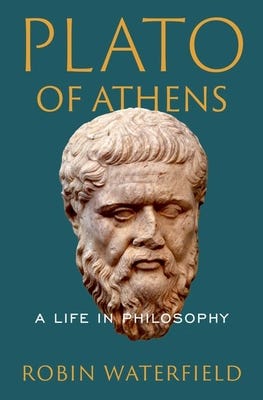Plato of Athens: A Life in Philosophy, Robin Waterfield.
Summary:
The first ever biography of the founder of Western philosophy.
Considered by many to be the most important philosopher ever, Plato was born into a well-to-do family in wartime Athens at the end of the fifth century BCE. In his teens, he honed his intellect by attending lectures from the many thinkers who passed through Athens and toyed with the idea of writing poetry. He finally decided to go into politics, but became disillusioned, especially after the Athenians condemned his teacher, Socrates, to death. Instead, Plato turned to writing and teaching. He began teaching in his twenties and later founded the Academy, the world's first higher-educational research and teaching establishment. Eventually, he returned to practical politics and spent a considerable amount of time and energy trying to create a constitution for Syracuse in Sicily that would reflect and perpetuate some of his political ideals. The attempts failed, and Plato's disappointment can be traced in some of his later political works.
In his lifetime and after, Plato was considered almost divine. Though a measure of his importance, this led to the invention of many tall tales about him-both by those who adored him and his detractors. In this first ever full-length portrait of Plato, Robin Waterfield steers a judicious course among these stories, debunking some while accepting the kernels of truth in others. He explains why Plato chose to write dialogues rather than treatises and gives an overview of the subject matter of all of Plato's books. Clearly and engagingly written throughout, Plato of Athens is the perfect introduction to the man and his work.
My mini-review:
Robin Waterfield has long been one of the leadings translators and interpreters of ancient Greco-Roman thought, and this latest book proves the point once more. Astonishingly, there was no modern biography of Plato before Waterfield's, so this is a much needed contribution indeed. The author has translated Plato, so he has a deep knowledge of the language and the philosophy, as well as of course of the time and place in which Plato lived. Waterfield is careful, whenever possible, to distinguish dubious anecdotes from historical likelihoods, is reasonably but not excessively critical of the ancient sources, and provides us with explanations for why he reaches certainly conclusions rather than others about various aspects of Plato's life and philosophy. This is a must read not just for those interested in Greco-Roman thought, or in philosophy, but for every thinking person. As Waterfield writes near the end of the book: “Plato opened up infinite possibilities for the future of philosophy ... for any of us who think and who care about what we are and what we may become, as individuals and as the human species. ... He founded the Academy, a school that perpetuated philosophy for almost a thousand years. Plato’s life was truly a life in the service of philosophy, and that is why his life should still matter to us. The big questions do not go away.”





I’ll look for/read it. As an aside, I’ve always thought Plato a bit “over-rated”... imo the greatest contribution he made was to ‘expose’ history to who/what Socrates was like. I know, I know 🙂